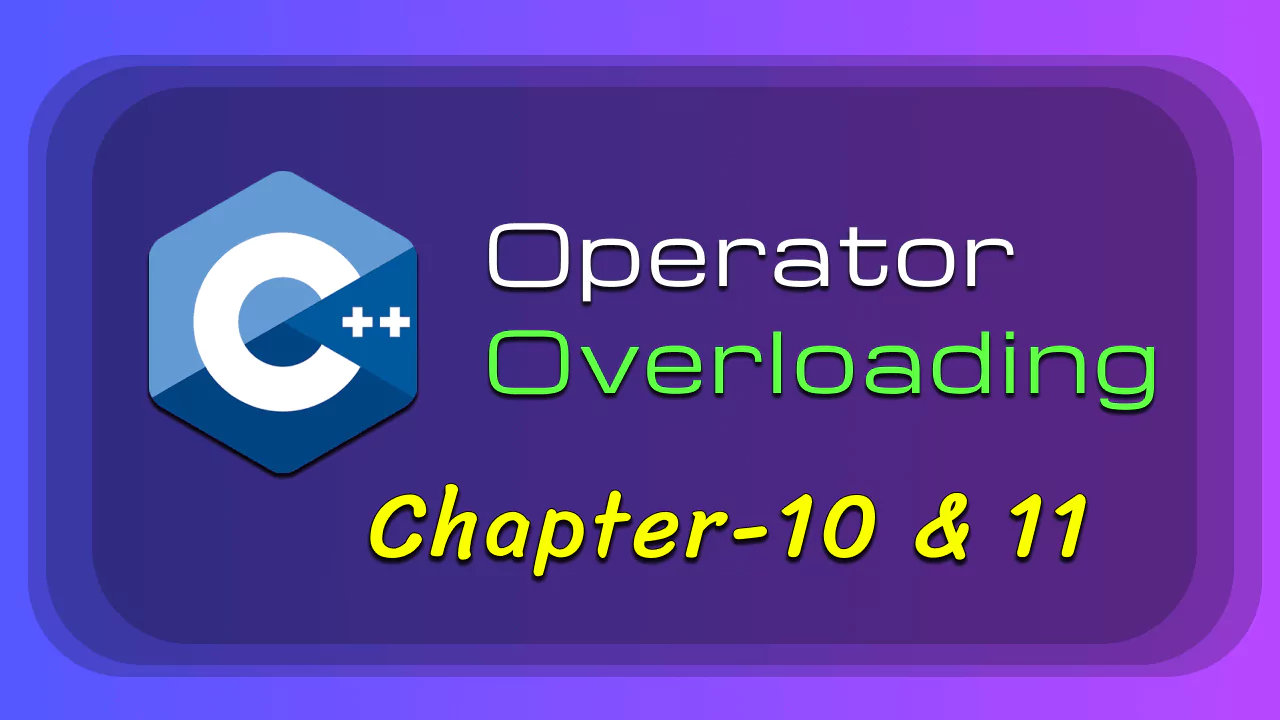Operator Overloading
Posted on November 18, 2022 • 3 minutes • 431 words
A special function operator can be used to overload operators.
Related videos
Syntax
return_type operator operator_symbol(arguments)
{
//body
return value
}where operator_symbol can be
%, +, -, *, / , ++, --, !, ==, !=, >=, <= , && , || , =, +=,*=, /=,-=, %= , [ ], &, |, <<, >>, ^, ~
4 operators that cannot be overloaded in C++
1. :: — Scope Resolution operator
2. dot (.) — operator
3. ?: — ternary operator
4. .* — Member pointer selector Operator
Types
-
Overloading binary-operators (+, -, ..etc)
-
Overloading unary-operators (++, – , ..etc)
1. Overloading binary-operators (+, -, ..etc)
#include<iostream>
class Complex
{
public:
Complex()
{
real = 0;
img = 0;
}
Complex(double r, double i)
{
real = r;
img = i;
}
Complex operator +(const Complex& c)
{
Complex ret;
ret.real = c.real + real;
ret.img = c.img + img;
return ret;
}
Complex operator -(const Complex& c)
{
Complex ret;
ret.real = c.real - real;
ret.img = c.img - img;
return ret;
}
void print()
{
std::cout << real << " + i" << img << std::endl;
}
double real, img;
};
int main(int argc, char const *argv[])
{
Complex c1(10,20);
Complex c2(5,10);
Complex c3 = c1 + c2;
c3.print();
Complex c4 = c1 - c2;
c4.print();
return 0;
}Overloading unary-operators (++, – , ..etc)
Types:
- prefix operators
Example : ++a , --a
//Syntax
returnType operator symbol()
{
//body
return
}- postfix operators
Example : a++ , a--
//Syntax
returnType operator symbol(int)
{
//body
return
}Example Program
class Number
{
public:
Number()
{
value = 0;
}
Number(int val)
{
value = val;
}
// prefix ++
Number operator ++()
{
//body
Number n;
n.value = ++value;
return n;
}
// postfix ++
Number operator ++(int)
{
//body
Number n;
n.value = value++;
return n;
}
// prefix --
Number operator --()
{
//body
Number n;
n.value = --value;
return n;
}
// postfix --
Number operator --(int)
{
//body
Number n;
n.value = value--;
return n;
}
int value;
};
int main(int argc, char const *argv[])
{
Number n1(10);
Number n2 = ++n1;
Number n3 = n1++;
std::cout << "n1:" << n1.value << std::endl;
std::cout << "n2:" << n2.value << std::endl;
std::cout << "n3:" << n3.value << std::endl;
Number n4 = n3--;
Number n5 = --n4;
std::cout << "n4:" << n4.value << std::endl;
std::cout << "n5:" << n5.value << std::endl;
return 0;
}
